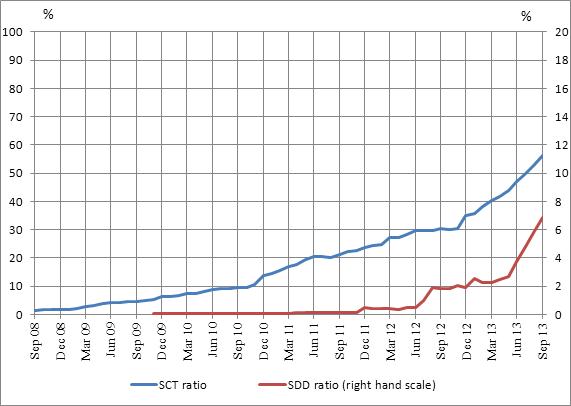- Migration progressing well for SEPA Credit Transfer, late for Direct Debit
- Last-minute migration poses operational risks for users and providers
- Everybody has to be ready by 1 February 2014
The European Central Bank (ECB) has today published its second report on migration to the Single Euro Payments Area (SEPA), analysing the state of play in euro area countries in creating a single market for credit transfers and direct debits in euro across Europe. The report also provides guidance on managing the transition process.
1 February 2014 is the deadline established by European law for euro area countries to migrate to the SEPA credit transfer (SCT) and SEPA direct debit (SDD) schemes. With only 100 days left to go, the changeover process is now entering a critical phase. The information compiled by the ECB and the euro area national central banks show that many key stakeholders have decided to migrate only in the last quarter of 2013, or even later. This approach generates operational risks and limits the ability to tackle any issues or unexpected developments that might arise during the changeover period.
“I have said this before and will repeat it: everybody has to be ready on 1 February 2014 or risk disruptions in their individual handling of payment orders,” said Benoît Cœuré, member of the Executive Board of the ECB, pointing out that this is also the position of the European Union Council and the European Commission. “Since our first migration report, we have been emphasising the fact that both payments providers and users are responsible for being sufficiently prepared. And our message to them is still the same: don’t leave it to the last minute.”
Quantitative indicators of actual migration and qualitative indicators of the preparedness of stakeholders show that migration to the SEPA credit transfer (SCT) scheme is progressing well. A few countries in the euro area have already completed the process, while many others are progressing at a swift pace. However, as for the SEPA direct debit (SDD) scheme, most stakeholders will only be migrating in the last few months before the deadline. While the overall preparedness of payment service providers seems satisfactory, many of their customers, particularly small and medium enterprises, still face significant challenges in terms of being sufficiently prepared in time for the changeover.
Payment orders that do not comply with the legal requirements as laid down in the SEPA Migration End-date Regulation will not be allowed to be processed by payment service providers after 1 February 2014.
Chart: SEPA Credit Transfers and Direct Debits as a share of all transactions in euro area

The report outlines some of the risks posed by a “big bang” late migration. These risks include capacity issues and bottlenecks on the side of the providers and software vendors at the end of the year, and a lack of time for end users to adapt to the payment service providers’ new standards as well as to test their own systems sufficiently.
“A successful migration will require considerable effort, so it is important to further strengthen communication and cooperation among key stakeholders and competent authorities at the national level”, added Mr Cœuré.


